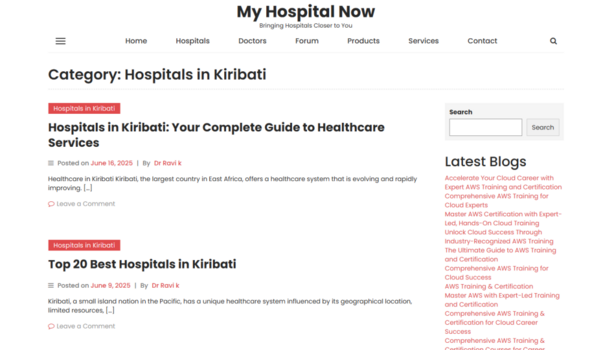
How Kiribati’s Island Medical Network Is Evolving for Savvy Health Travelers
Imagine receiving essential surgery or maternity care on a Pacific paradise—accessing community hospitals, local experts, and genuine care just steps from the ocean. For international patients, families, and medical professionals, Kiribati is both a challenge and an inspiration: its top hospitals are rapidly improving facilities, expanding access to international support, and placing patient-centered care at the heart of their mission—even amidst logistical hurdles unique to remote island life.
While Kiribati cannot match the technology or range of giant medical tourism hubs, its hospitals stand out for personalized medicine, resilience in the face of resource shortfalls, and patient journeys that blend clinical quality with remarkable warmth. Central and regional hospitals now offer visa support, English-speaking staff, and care pathways tailored for short-stay surgery, maternity, and emergency stabilizations—all supported by government, global partnerships, and visiting specialist teams. If you want to experience healthcare delivered with real heart (and a touch of ocean breeze), Kiribati’s evolving system deserves your close attention.
This comprehensive MyHospitalNow.com guide brings clarity on where, how, and what to expect—helping medical travelers plan smarter, avoid surprises, and appreciate why Kiribati is a rising but grounded player on the medical tourism map.
Table: Key Hospitals in Kiribati – Capacity, Doctors, and Specializations
How to Plan a Successful Medical Trip in Kiribati
1. Research Realistically & Contact In Advance
- Use MyHospitalNow’s Kiribati directory to compare hospitals, see which clinics match your treatment needs, and check recent capacity.
- For any procedure beyond basic care, always connect with the main hospital (Tungaru or Tarawa) for referral, remote consult, and to clarify if your case can be treated locally or stabilized for transfer elsewhere.
2. Confirm Documentation, Arrival, and Insurance
- Bring all medical records, prescriptions, insurance, vaccination proof, and your own supply of essential medicines—pharmacies are limited and supply interruptions are common.
- Get a “medical invitation” from the hospital if you need a visa for treatment/recovery travel.
- Arrange funds and travel insurance that includes air evacuation for major cases or complications.
3. Arrival: Make the Most of In-Hospital Support
- Hospitals provide basic English-speaking patient advocates and help with paperwork.
- Private/family rooms are limited; for companions, plan early for hotel or guesthouse stays.
- Regional hospitals (Kiritimati, Southern Kiribati) are self-sufficient for emergency triage, maternity, and stabilization—complex surgery, imaging, or oncology almost always requires transfer.
4. Surgery, Recovery, and Discharge
- Most care is inpatient and hands-on: daily rounds, nurse check-ins, and direct doctor-patient communication.
- Aftercare focuses on wound care, pain management, nutrition, and community referrals for ongoing care on home islands or evacuation if necessary.
5. What If You Need Overseas Care?
- Kiribati hospitals can stabilize critical patients and arrange for emergency air transfer to Fiji, Australia, or New Zealand—make sure your travel or expat insurance can cover this.
Surprising Stats & Patient Tips
- Tungaru Central Hospital now handles over 60% of all complex care for the nation’s 100,000+ people—yet waits remain reasonable for emergency, maternity, and minor surgery.
- Government-Hospital partnerships have trained 40% of the entire workforce in recent years, and upgrades in transport mean 80%+ of outlying hospitals now offer coordinated patient transfer.
- All major hospitals cater to English-speaking and expat patients—even in remote islands, basic but effective communication is possible.
- Essential supplies and drugs can be limited: always bring extra, including prescription/OTC drugs and wound/diabetes/asthma supplies.
Actionable Tips & Insider Advice
- Confirm your main doctor speaks English, and ask for a translator for local dialects.
- For non-critical care, bring digital records and all medicines.
- Electric power can be interrupted; charge devices and keep inpatient comfort aids handy.
- Most insurance is accepted for simple treatment, but major/complex cases may require out-of-pocket and later reimbursement from your home provider.
Success Story: Island Care, Global Touch
A UK expat in Tarawa needed a C-section—Tungaru Central Hospital arranged English-language care, remote gynecologist tele-consult, and post-discharge community outreach, turning a stressful emergency into a safe, well-guided birth. “MyHospitalNow made it so much easier to navigate Kiribati’s system—I felt heard, not lost.”
FAQ & MyHospitalNow Program Feedback
Is care reliable?
For routine/emergency/maternity—yes, especially at Tungaru and main clinics; complex care may be referred abroad.
Is insurance accepted?
Basic insurance usually works for care, but always confirm with providers and bring extra funds.
Can I bring family?
Family rooms are limited, but most hospitals support/recommend simple stays, and visitor services are improving.
How does MyHospitalNow help?
“MyHospitalNow made it possible to compare hospitals, contact the right liaison, and know exactly what to expect. Their resources were vital for a safe, informed stay.”
Your Smart Path to Healing in Kiribati
For the latest in local hospital capacity, planning lists, cultural advice, and direct booking support, visit MyHospitalNow’s Kiribati Hospital Directory—your all-in-one resource for safety, clarity, and reliable care in the heart of the Pacificcific.